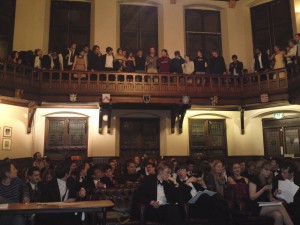Cambridge IV 2010: Monash wins / Zagreb to bid for WUDC 2013
In the grand final on Saturday evening, Victor Finkel and Fiona Prowse of Monash A won the Cambridge IV 2010 as opening opposition in the final debate on the motion “This house believes in the virtue of a disproportional military response”. Monash A prevailed over Durham A (Pam Cohn and Guy Miscampbell), Manchester A (Sam Block and James Dixon) and Sydney Union A (Tim Mooney and Naomi Hart). Monash University is based in Melbourne, Australia.
Shortly before, Rob Honig and Ali Al Khatib as Leiden B had won the ESL final (i.e. the category for speakers of “English as a Second Language”) on the motion “This house would send private military contractors to police high crime areas”. Leiden B won the debate from first government, defeating Babeş-Bolyai University A (Octavian Buta and Grigore Pop from Romania), Utrecht C (Alex Klein and Alexander Vervuurt) and their fellow club members of Leiden A (Rogier Baart and Koen van Schie). Rob Honig and Ali Al Kathib were the ESL champions of the 2009 Euros in Newcastle, UK.
The biggest news for debaters was announced by Jonathan Leader Maynard: Zagreb, capital of Croatia, bids for the 2013 World Universities Debating Championships, competing now with Berlin to host the world’s biggest debating jamboree. Jonathan would himself be chief adjudicator of Worlds in Zagreb. A website with further details on the bid is already online.
International participation was strong at the Cambridge IV, including teams from continental Europe, Asia, the United States and Australia. Many teams from far away had already been at the Oxford IV one week earlier and had stayed in the UK in the meantime. Of the 105 teams competing in the Cambridge IV, 23 teams had ESL status. Six teams were sent from Germany, representing the debating societies of Berlin, Jacobs University Bremen and Potsdam. “Berlin B” (Niels Schröter and Filip Bubenheimer) was the only German team to make the ESL break, but lost in the semis.
The quality of adjudication, overseen by chief adjudicators Art Ward (Worlds Finalist 2010) and Daniel Warents (Worlds Finalist 2008), was widely praised among participants. Indeed, adjudication panels were abundant with top debaters, often with several Worlds, Euros or Australs finalists crammed behind the jury’s table. “I really appreciated getting feedback from world-class judges such as Shengwu Li,” said Aaron Hakim, a Yale debater. Coming from the U.S., his team went to Cambridge to gather experience in British Parliamentary debating. On the other hand, adjudicators seemed happy with the quality of the debates staged at the Cambridge IV, too. “I have seen fascinating teams,” said Sergej Arkhibenko, an adjudicator from Moscow. “I think the semi-finals brought about the best of British debate,” Richard Robinson from Manchester said.

As the Cambridge IV's main final begins, the Irish perform an interruption on the balcony, giving the finalists (on the right) some additional preparation time. (Photo: Filip Bubenheimer)
Beyond that, debaters enjoyed the atmosphere at the Cambridge Union’s 19th century building, with the corridor walls featuring notable members of the Union and famous speakers of the past and the house-of-commons-like Debate chamber. The Irish delegation used the chamber’s balcony at its best at the beginning of the grand final for what is known as the “Irish interruption”, a potpourri of patriotic impromptu speeches and songs, culminating in Ireland’s national anthem.
Full list of motions:
- Round 1: This house believes that all jurisdictions should recognize pre-nuptial agreements as binding on the parties in case of divorce.
- Round 2: This house believes western governments should fund Madrasahs abroad.
- Round 3: This house would make casinos and bookmakers liable for the debt of problem gamblers.
- Round 4: This house would disband the UN.
- Round 5: This house believes governments should provide free drugs to addicts.
- ESL Semis: This house would not allow corporations to donate to any political party or election campaign.
- ESL Final: This house would send private military contractors to police high crime areas.
- Main Quarters: This house believes that development countries should create special economic zones.
- Main Semis: This house would compel all news organizations to adhere to political balance regulations.
- Main Final: This house believes in the virtue of a disproportional military response.
Filip Bubenheimer / apf






Monash war in der eröffnenden Opp.
PS: das Turnier war ziemlich cool! toller bericht, ich schäme mich meinen nicht schon längst eingereicht zu haben…